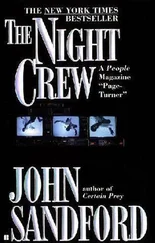The suits even offered entertainment: the heads-up virtual screen could show movies, vids, reading material, even games, whatever the wearer had uploaded into the suit databanks, or had transmitted to it. None of the team had bothered uploading data for this trip; boredom seemed unlikely to come up inside Saturn’s rings, with the vast delicately colored expanse of Saturn itself hanging to one side and aliens awaiting them.
Beneath the seats, the life-support system sat on top of an open framework equipped with grapples, maneuvering actuators, and tie-downs. The front of the bus was equipped with manipulator arms, like the claws on a lobster. At the rear end of the bus were the rockets. The bus “cruised” at a maximum ten kilometers a minute, a snail’s pace by the standards of space travel, but entirely sufficient for the bus’s normal operating range of a thousand kilometers.
The first trip to the alien constellation’s primary would be an easy half-hour run, and over that distance, fancy orbital mechanics didn’t come into play: Gorey could fly it by the seat of his pants.
The five-kilometer primary was impossible to miss if you knew where to look; it was dim and dark, but it was twice the size of the full moon. When they were loaded, strapped in, checked one last time by Barnes, Fang-Castro gave them the go-ahead.
Barnes said, “Mr. Gorey. You’ve got the wheel.”
The bus unlatched from the ship, Gorey gave it a tiny boost to the left, pointed it slightly inboard of their alien objective, and opened the engines. The bus’s quarter-gee acceleration brought them to their cruising velocity in barely over a minute; it felt oppressively heavy to people who’d been living in a tenth of a gee for half a year.
Hannegan, the physicist, said, “My God, when we get home, it’s gonna hurt, the gravity is.”
“That’s why you’ve got to keep coming to the PE classes,” Barnes said. “If you don’t, going home won’t just hurt, it’ll kill you.”
Sandy kept his high-resolution cameras running all the way in, with the recordings retransmitted to the Nixon as they were made. Gorey stopped the bus ten kilometers out. Fang-Castro asked, “Anything?”
“Not that I see,” Barnes answered.
They’d agreed that purely passive reconnaissance was the safest course. No laser altimeters or radar-mapping, nothing beamed at the alien structure, nothing that could be interpreted as hostile or invasive. They thought they’d been invited… but what if they were wrong?
The bus trip had been timed so that they’d arrive shortly before the primary’s rotation brought the rainbow target in line with the Nixon . The scientists had wanted the bus to loop around the primary, so that they’d have a minutely detailed record of its entire surface, but Fang-Castro had vetoed the idea. The bus would never be out of sight of the Nixon , not on the first trip.
Barnes: “Here comes the target.”
As the alien sphere turned, the rainbow target slowly appeared, brightening and sparkling but now something new happened. A hundred meters off to one side of the rainbow, a new, smaller bull’s-eye target began to glow, in repeating concentric rings of yellow, green, and blue that shrank toward the center and disappeared.
Barnes: “John, is that a landing port?”
Clover said, “Can’t see what else it could be.”
Barnes said, “Admiral, unless you object, I’m going to have Elroy take us in. Otherwise, we’ll be waiting another four hours before you’re line-of-sight with us.”
“I concur,” Fang-Castro said.
“Elroy…”
Gorey took them in. As they closed, a port began to open in the middle of the smaller rainbow target, and a massive shelf pushed out.
“One damn fine mousetrap,” Clover laughed.
“Not helping, John,” Barnes snapped.
Sandy glanced at Fiorella, who was smiling into the mini-Red she’d stuck to the rail of the bus, talking a kilometer a minute.
Barnes: “That shelf could take the bus. Do we land it? Or do we leave the bus hanging? If we land it, it’ll rotate out of sight.”
There was a long silence, then Fang-Castro said, “We now agree here that you should land the bus. Then, if you’re asked to leave, or pushed out, you’ll have something to leave with—you won’t be hanging on the wrong side of the primary without a ride.”
Barnes: “Take it in, Elroy.”
The bus landed on the primary without incident and extruded the Post-its to hold it to the surface. As soon as the bus was secure, the crew began unplugging from the bus and to go on full internal suit support.
Barnes worked through the agreed-upon procedure: “Everyone stay together. Check your tethers. I don’t want anyone flying free. Nobody touch anything without my approval. Nobody armed except Emwiller, and make sure your weapon is safed, Sally. No other external equipment except for Sandy’s camera gear. Ready?”
They were ready.
“Then let’s go.”
____
They floated just above the regolith of the primary. As soon as they moved away from the bus, maneuvering with their suit thrusters, a line of glowing dots appeared on the regolith leading toward the rainbow target. The dots flowed toward the open port.
“Interesting,” said Hannegan, the physicist. “The surface doesn’t change, it’s like the light is moving through it. I’m guessing some kind of cellular automata or nanobots, they’re what’s making the lights. Nice. The ultimate programmable signage. You getting this, Sandy?”
“I am now.” Sandy was pointing his camera at the surface, cranked up to maximum magnification. In his viewfinder, he could see the surface was packed with speckles that brightened and darkened in a coordinated way. They reminded him of the chromatophores he’d seen on the skins of squids and octopi.
The crew floated through the open port into a white, cube-shaped chamber, large enough for a small orchestra. The door that was open to space was behind them, but there was a closed door in front of them. A green pad the size of a dinner plate was next to the closed door.
Barnes looked at Clover. “What do you think?”
“What does green mean, on traffic signals almost everywhere on Earth?”
Barnes shrugged, reached forward, and punched the button.
The door behind them closed and a light winked on Sandy’s camera: “George, I just lost the link back to the Nixon .”
Barnes tried calling the Nixon . There was no response. “The interior must be EM-blocked. Why am I not surprised? Okay, people, we are really on our own now. You follow my orders. You do what I tell you, when I tell you to do it. You do not take the initiative, not if you ever want to come back here again. We take everything slowly.”
Gas began venting into the chamber. When it hit one atmosphere, according to their suit gauges, the inner door opened. They moved forward, and somebody muttered, “Standard air lock…”
When they’d all entered the second chamber, the door behind them closed. The room was larger than the first, but not much, possibly ten meters long and eight wide, also a featureless white with diffuse lighting. The only item in the room was a stand-alone console toward the back of the room. A meter and a half high, it would’ve been impossible to miss even if the room had been as cluttered as a secondhand junk store: it glowed with flickering bands of rainbow colors and looked disturbingly similar to an antique jukebox.
Words appeared in the air above the console that read: “You can remove your helmets. The air is sterile and breathable to Earth standards and is maintained at 21 degrees Celsius.” In a few seconds, the words changed to Chinese ideograms, followed by Arabic and Russian, then a half-dozen other languages, before it cycled back to English. Barnes looked over at Emwiller and said, “Sal, I’m cracking my helmet. If I collapse, get everyone out of here, pronto. Shoot out the air lock if you have to.”
Читать дальше








